
132% increment in foreign tourists in four months
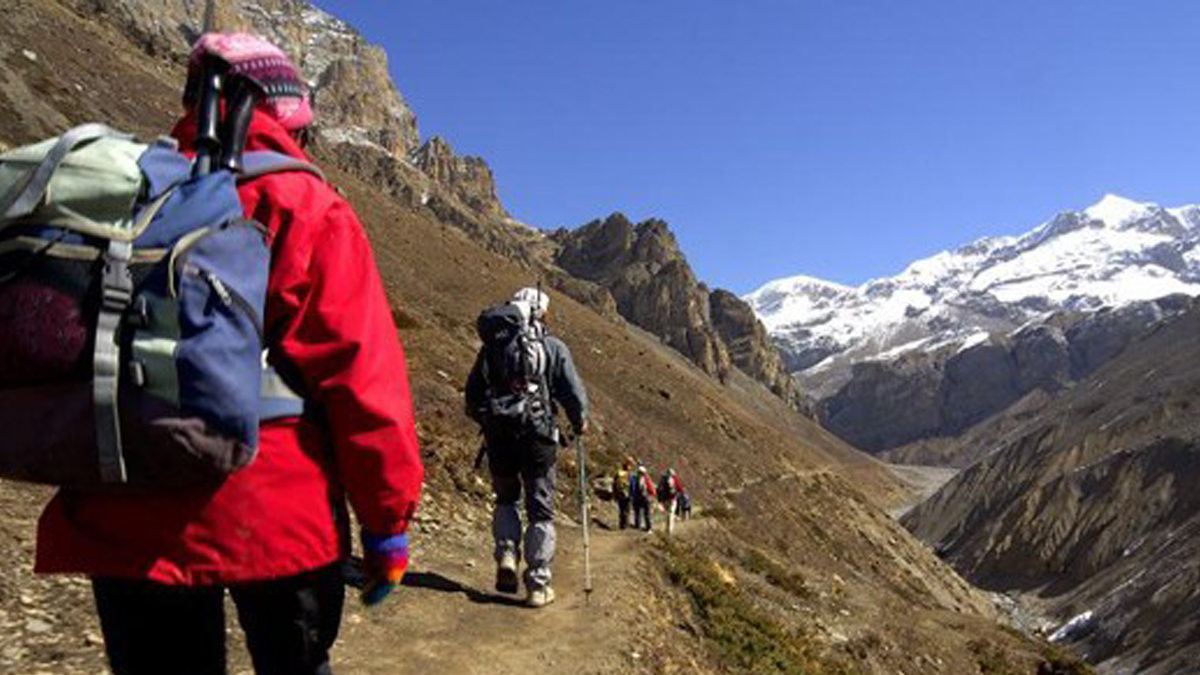
Nepal has witnessed an encouraging arrival of 326 thousand 527 foreign tourists in the first four months of 2023. The figure is a 132.67 per cent increment as compared to the same period in the previous year, 2022. A total of 140,336 foreign tourists visited the country during the same period in 2022.
Global COVID-19 hit the tourism sector of the country with a sharp drop in the influx of foreign tourists in the past few years. Just before the pandemic, a total of 420,446 foreign tourists visited the country in the first four months of the year 2019. In the following years after the virus, there was a sharp drop in the inflow of tourists. A total of 220,682 tourists arrived in Nepal in 2020. The figure further dropped to 55,447 in 2021.
Factors like a surge in the inflow of tourists and recovering occupancy of hotels have indicated the revival of the tourism sector from the infection. Director of the Nepal Tourism Board (NTB) Maniraj Lamichhane said tourism has almost been on track. “Factors like the inflow of foreign tourists, encouraging a number of people taking the permit to climb mountains and increasing mobility of tourists at tourism destinations have indicated the revival of the tourism sector. Tourism will soon keep its track by prioritising one-stop destinations and expediting aggressive marketisation,” he said.
The influx of foreign tourists in the first four months of the year, 2023 has almost kept up with the figure during the same period in 2019 before the pandemic, which is a positive sign, he said.
There is a need for the rebranding and repositioning of destination marketing so as to make the tourism sector more mobile, he suggested.
Projection of the World Tourism Organisation
The World Tourism Organisation has projected the revival of Nepal’s tourism sector until 2023. By 17 January 2023, the country’s tourism would be revived by 80 to 95 per cent, it said. Global tourism including Nepal’s would be recovered by up to 95 per cent.
Factors like the latest tendency of people visiting accessible and nearest destinations, and China remaining open to tourists have added, it said.
The number of foreign mountaineers taking the permit to scale mountains has been also encouraging. Spring this year has witnessed a record highest number of mountaineers who have taken the permit to climb Sagarmatha (Mt Everest), according to the Department of Tourism. During the season, a total of 467 climbers from 44 groups (98 women and 369 men) took the permit to climb mountains as of May 9, said Bigyan Koirala, section officer at the mountaineering section, the Department of Tourism, adding that the number could increase. The number of people who have taken the permit to climb mountains this season was a record high in the history of 70 years of the ascent of Mt Everest, he said.
People from 65 countries including from Nepal took the permit. Over Rs 660 million was collected in revenues by issuing the permit to scale Mt Everest.
Most of them have reached the base camp of the world’s tallest peak, and they are reported to be waiting for a food in weather conditions, it has been said. Icefall doctors’ team has cleared the route to the fourth camp or the South Col. The expedition team could not push their way ahead due to bad weather conditions above 7,500 feet on Mt Everest, it has been said.
Flights recovering
Around 300 roundtrip domestic flights have taken place, said Teknath Sitaula, Spokesperson for the Tribhuvan International Airport (TIA). Nine airlines and 11 helicopter companies are operating domestic flights. Similarly, 27 airline companies including three Nepali ones are operating international flights. Of the total 54 airports including three international ones in the country, 36 are operational.
Despite getting into approximately Rs 48 billion debt, the Nepal Airlines Corporation, the national flag carrier of the country, is planning to add more three aircraft. Currently, it has two wide-body and two narrow-body aircraft for international flights. Similarly, it has two Twin Otter planes for domestic flights.
In view of the marketing of tourism, the Tourism Board has a plan on the table to expand the market across India, Bangladesh and China. Europe and the United States have recovered in terms of tourism following the infection. The Asian countries are on track to achieve tourism revival.
Lately, Chinese tourists have visited Nepal in hordes, it has been said. Following the virus, 180 Chinese tourists visited Nepal through chartered flights. Minister for Culture, Tourism and Civil Aviation welcomed them at the TIA.
Before the pandemic, around 170,000 Chinese tourists arrived in Nepal. Lately following the virus, the influx of Chinese tourists has been encouraging, said the Tourism Board Director Lamichhane.
According to him, the country saw the arrival of around 1,800 Chinese tourists in February 2023. The number encouragingly surged 30 per cent to 2,600 in March, and 81 per cent to 4,770 in April. Flights from China to Nepal have also been added.
The marketisation has resulted in a significant surge in the influx of tourists from India and Bangladesh as well, he said.
Now, the arrival of Chinese tourists would increase as the Nepal-China transits have reopened, and flights are operating, he expressed hope.
General Secretary of the Nepal Mountaineering Association Mohan Lamsal offered his hope that enthusiasm for climbing Mt Everest this season, and activities in the run-up to the 70th Anniversary of the first successful ascent of Mt Everest would make the country’s tourism mobile.
Hotels and hospitality centres in the country have a capacity of accommodating around 3.5 million tourists. There are around 10,000 hotels ranging from five stars to tourist standard ones in the country.
At present, there are 18 five stars hotels including a deluxe one in the country, according to the Hotel Association Nepal (HAN). Around 20 five stars hotels will be added in one and a half years. Over two dozen chain hotels are also ready for operation. The HAN President Binayak Shah said the affected tourism sector of the country has gradually come back on track.
However, there is still a setback for hotels. There is only 30 per cent hotel occupancy as of now, said hotel entrepreneurs. It requires at least 38 per cent occupancy to cover the daily operational expenses of a hotel, they said.
“Now we can bring packages to attract tourists. Hotels have been hit hard due to a lack of tourists for the past three years due to the pandemic. As a result, hotel entrepreneurs have faced such a situation that they are finding it hard to pay off bank loans and interests. Until the previous fiscal year, the government had tried to address our problems through monetary policy. But, this is not the case since the current FY. So, we have put forward our problems with the government,” he said.
Returns on investment?
According to data, Rs 1,700 to Rs 1,800 billion have been invested in the hotel sector. The influx of tourists in recent years has not been enough to get hotels to survive the present worse situation.
In such a situation, to save the hotel sector, the government should take steps like fully operating Pokhara and Bhairahawa international airports, viewed Shah.
“It will be meaningless to only construct airports without their operation. We are unable to operate other aircraft except for the ones of the NAC. We cannot bring in 3.5 million tourists when airports cannot operate fully. There is a doubt that the government cannot do the marketisation substantially. For this, the government should cooperate with the private sector,” he suggested.
President of the Thamel Tourism Development Council, Bhabishwor Sharma concurred with Lamichhane. The country’s tourism is gradually recovering, and this has encouraged tourism entrepreneurs, he said.
“Encouraged by the gradual revival of the tourism sector, tourism entrepreneurs are working with positive vibes. There has been around 80 per cent hotel occupancy in the Thamel area. Chinese tourists are increasing,” he said.
He stressed the need for a partnership between the government and the private sector to additionally make the industry mobile.
Similarly, President of the Trekking Agencies Association of Nepal, Nilhari Bastola stressed the need for policy improvements, destination expansion and marketisation so as to make the tourism sector mobile.
Also, President of the Nepal Association of Tour and Travel Agents Ramesh Thapa emphasised the putting forward of planned programmes for accelerating the revival of tourism. (RSS)


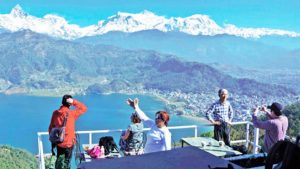
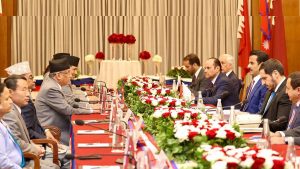
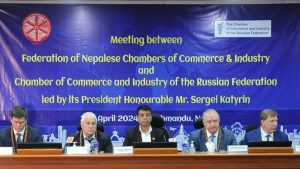
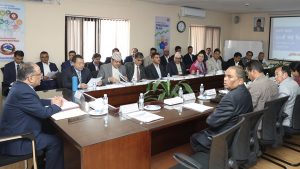
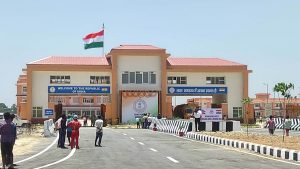
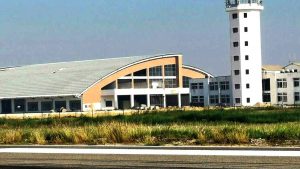


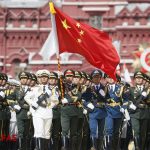



Comments